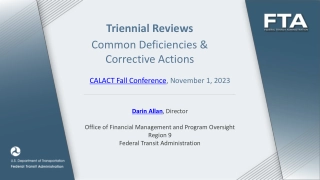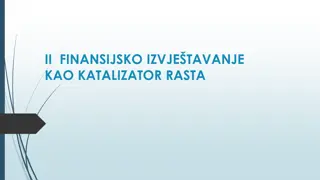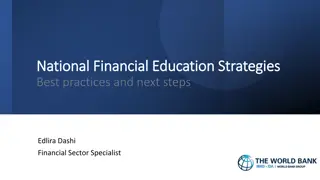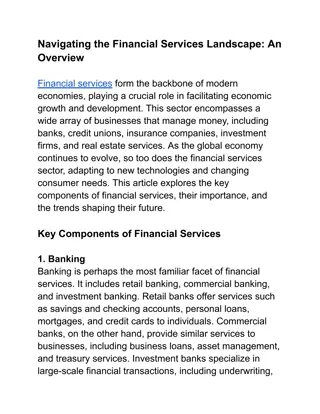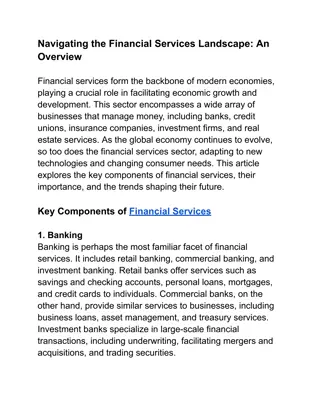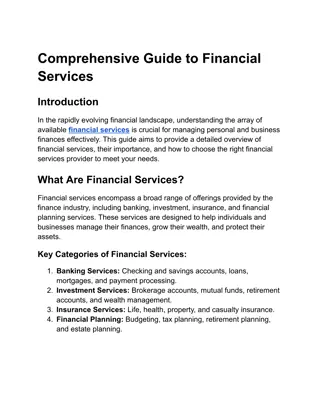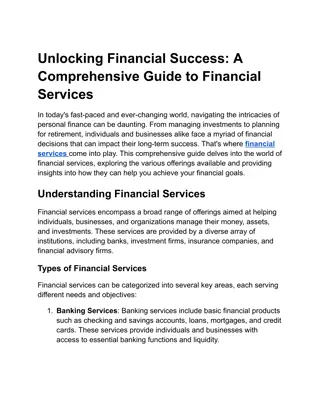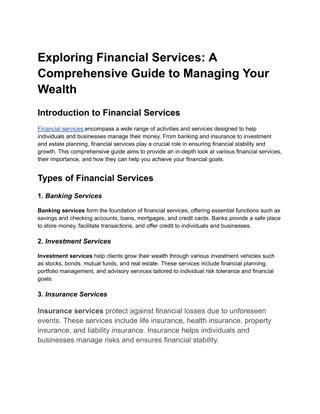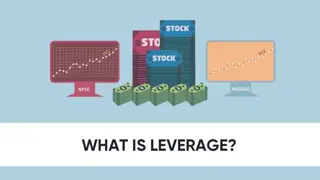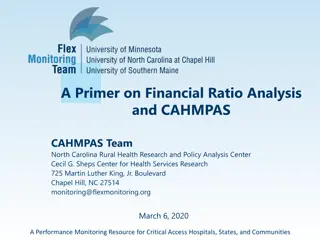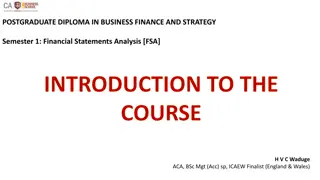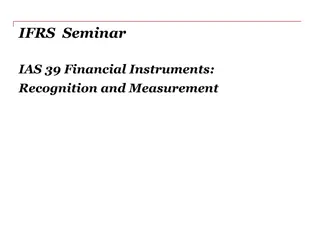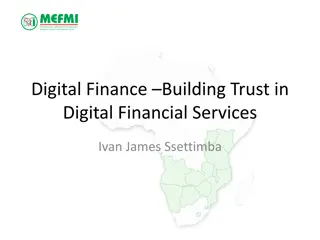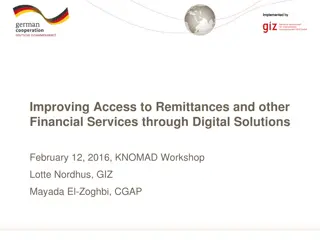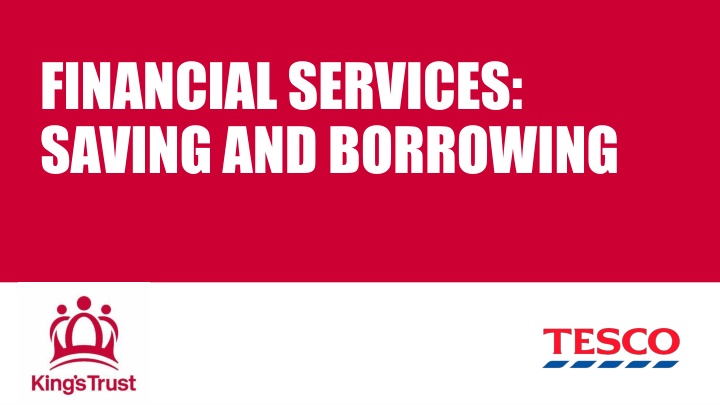
Financial Services: Saving, Borrowing, and Debt Management
Learn about financial services, saving strategies, borrowing tips, and how to manage debt effectively. Explore key terms, quick-fire quizzes, spending control tips, handling debt, financial advice organizations, and the importance of savings.
Download Presentation

Please find below an Image/Link to download the presentation.
The content on the website is provided AS IS for your information and personal use only. It may not be sold, licensed, or shared on other websites without obtaining consent from the author. If you encounter any issues during the download, it is possible that the publisher has removed the file from their server.
You are allowed to download the files provided on this website for personal or commercial use, subject to the condition that they are used lawfully. All files are the property of their respective owners.
The content on the website is provided AS IS for your information and personal use only. It may not be sold, licensed, or shared on other websites without obtaining consent from the author.
E N D
Presentation Transcript
FINANCIAL SERVICES: SAVING AND BORROWING
KEY TERMS Debt: If you are in debt or get into debt, you owe money. Debt relates to money borrowed from someone else, which would need to be repaid normally with interest added. Credit score: A score (between 300 and 850) given to an individual. The scores are based on how much debt a person has, how well they have repaid previous loans, the number of accounts they have and other factors. Interest: The charge for borrowing money, typically presented as an annual percentage rate
QUICK-FIRE QUIZ 1. What is the average student debt on leaving University excluding tuition fees (accommodation and living costs)? a) 7,600 b) 11,000 c) 33,000 d) 4,000 2. How much average debt does an adult have in the UK? a) 7,600 b) 21,000 c) 8,000 d) 30,000 3. If you put 100 in a bank account for a year giving 10% interest, how much interest will the bank give you? a) 10 b) 1.10 c) 1 d) 0.10
HOW CAN WE CONTROL OUR SPENDING? 1. Avoid spending on things you don t need: Understand whether you need it or want it Understand whether it is essential or not 2. Explore alternatives that are better value for money: Second-hand/recycled items Discounts from retailers Vouchers available online 3. Become an expert on your money and make it work for YOU! Understand your spending habits Keep to a budget Have a savings plan
IF YOU FIND YOURSELF IN DEBT Don t be an ostrich and bury your head in the sand. Do something about it! Acknowledge your debt Seek help talk to family/close friends or an organisation that provides free advice, guidance and support Get a plan in place There are some great online tools to help you with budgeting, including budget trackers, money health check tools etc.: https://www.tescobank.com/guides/ Don t panic
FINANCIAL ADVICE ORGANISATIONS If you find yourself in debt, you can contact these organisations for free financial advice and guidance. MoneyHelper Citizens Advice National Debtline StepChange
SAVINGS Safety net Saving for a specific short-term goal Saving for a rainy day Saving to give you peace of mind and less stress Why is saving important? What are the advantages of having savings?
TOP TIPS FOR SAVING 1. Open a savings account and transfer a regular amount weekly/monthly, or as much as you can afford every little helps! 2. You could visit your bank or building society or websites, such as MoneySuperMarket or Tesco Bank (check out tescobank.com) for information about savings. 3. Shop around for deals there are sales and discounts everywhere. Check online for discount codes before you buy.
TOP TIPS FOR SAVING 4. Are you getting the best deal for your mobile phone, driving lessons or car insurance? You can use comparison sites to check. 5. Sell your old trainers, clothes or phone for cash use marketplace sites like Shpock, eBay, Amazon, Etsy or Facebook marketplace.
SHOULD YOU BORROW OR SAVE? What should you consider? SAVING How much do you need initially to open the account? Do you need to pay a regular amount every month into that account? How much interest do you get? Will the % be higher if you don t have instant access to it? How many withdrawals can you make from that savings account if you need to? Are there any free promotional gifts if you open up a savings account? E.g. the bank giving you an additional 50 once you ve paid your first savings payment.
SHOULD YOU BORROW OR SAVE? BORROWING Do you need to borrow? It s expensive and a big financial commitment, so you need to be 100% sure this is the option for you. How long is the term time? Can you continue to pay that amount until the amount is paid in full? Know your interest rates how much will you need to pay back at the end? Are there any penalties if you pay the amount back late or early? Think about challenges you may face and account for these. What happens if you miss a payment?
TEACH TEENAGERS! A social entrepreneur has asked you to set up an organisation that teaches teenagers the basic of finance! Your task is to create a lesson for students in school or college. It could take the form of: A PowerPoint presentation A video A speech/script with handouts, leaflets etc.
TEACH TEENAGERS! Include: Your organisation's name and purpose Examples of financial services banks and building societies offer Why saving is a good idea 2 different ways to borrow money and the advantages and disadvantages of these!
FINANCIAL WELLBEING This term describes an individual s feeling of having control over their finances and being able to comfortably have and do all the things they want. Has some money spare every month but no savings account, has a goal but not good at planning Saves regularly and takes advantage of deals, has goals for the future No plan, no goals, no savings, lives for the moment 10 1 Some awareness about money but not very proactive Not financially-savvy Extremely aware On scale of 1-10 = 1 On scale of 1-10 = 8 On scale of 1-10 = 4

